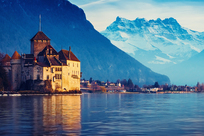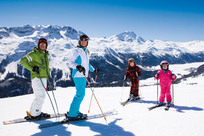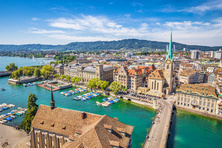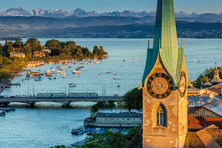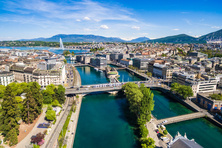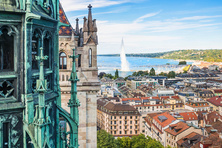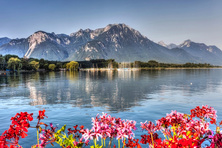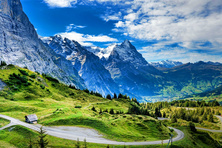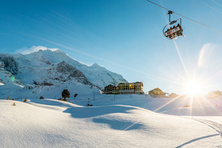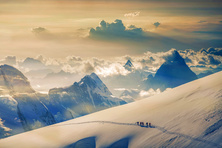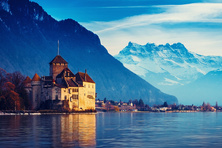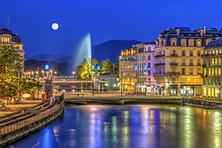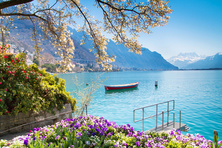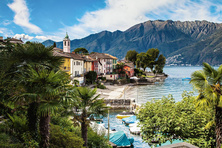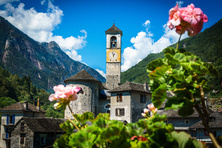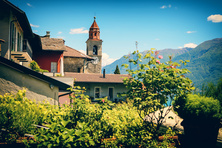Switzerland
- Capital:Berne
- Currency: Swiss franc
- Time: UTC+1, summer UTC+2
- Languages: German, French, Italian, Romansh
- Religions: Christianity (Catholicism, Protestantism)
- Sections: Get in Visa Customs Cuisine Money Details of interest Popular resorts
Switzerland or officially the Swiss Confederation is a state in the western part of the European Continent. It borders Germany, France, Italy, Austria and Liechtenstein. The major part of the country lies in the Alps. The capital is Geneva.
The climate in Switzerland varies from region to region and the difference may reach 10-15°C. On the south of Switzerland, the climate is Mediterranean. The central region has a temperate climate and in the mountains the climate is continental. Winters are colder in the mountains and it can be as cold as -15°C. On the south of Switzerland, the weather is almost always warm and in summer the average temperature is +28°C.
You will enjoy your holidays in Switzerland all the year round. If you want to spend time on the amazingly beautiful Swiss lakes, come to the country from June to September. The best for visiting ski resorts is from November to April.
There are four official languages in Switzerland: German, French, Italian and Romanish. The majority of the Swiss are the Catholics and Protestants.
Switzerland is a paradise for skiers. The Alps is the home country of alpine climbing and ski slopes. In the central Switzerland, there is a resort town Andermatt. The city of Lungern is an ideal place for sports activities and entertainments. The most popular ski resorts Zermatt and Saas-Fee are open all the year round.
Switzerland is famous not only for its ski resorts, but also for its healing lakes and wellness resorts. A luxurious resort Bad Ragaz offers an interesting excursion program. Go to Berne if you like historical buildings. This city is called a 'treasure house of museums'.
You can also have a beach holiday in Switzerland. The Geneva lake is the largest water basin on the entire territory of Europe.
Get in
By Plane
The most convenient way to get to Switzerland is a flight. Russian and Swiss airlines offer regular flights to Geneva.
Swiss airlines offer flights from Belarus, Ukraine and Riga.
There are flights with a stop in Turkey from Russia and other CIS countries to Switzerland.
By Train
You can take a train to go to Switzerland with a stop in Berlin, Paris or Vienna.
By Bus
An international bus runs from Russia to Switzerland and the trip will take you over 2.5 days. This is the route with a stop in Germany.
Visa
Switzerland is within the Schengen area and the tourists need to obtain a visa to come to the country.
A visa is usually ready in four days. You can submit the documents for a visa personally or through a representative (provided that a representative has a certified copy of power of attorney).
You can submit the documents to the Embassy by appointment only.
An application form is filled online on the website of the Embassy in English, French and German.
Customs
Switzerland is within the Schengen area, but it is a non-EU country. For this reason, there is a customs control on the borders with EU countries.
The customs rules of Switzerland do not restrict foreign currency import and export.
The following goods can be imported duty-free: personal belongings, cigarettes and alcohol. The travellers can bring all these things within the limits.
The travellers from the non-EU countries are not allowed to import meat, dairy products, honey and other bee products. Nutrition for babies and medications can be imported in an amount needed for one day.
It is prohibited to import to Switzerland:
- fake watches;
- absinthe;
- the skins of wild cats, crocodiles and lizards;
- plants and soil.
The travellers can bring maximum two sporting guns or shotguns provided that they have the documents confirming their participation in hunting or sporting competitions. The tourists can bring to Switzerland dogs with cropped ears and docked tails only if they have a confirmation (pet passport) that a pet is not of a forbidden fighting breed. Each pet must have a microchip with an information about vaccination.
The travellers must declare the Swiss cheese in excess of 15 kg.
Cuisine
The cooking traditions of France, Germany, Austria and Italy had their impact on the Swiss cuisine. The only true Swiss dish is fondue. In a classical recipe of the Swiss fondue, there are five types of Swiss cheeses melted in white wine. We also highly recommend trying chocolate and fruit fondue.
Cheese is one of the main ingredients in many Swiss dishes. It is used for soups, vegetable casseroles, meat and fish. The Swiss even roast cheese. The Swiss cheese deserts are very popular among the travellers and the Swiss themselves. Do not leave Switzerland without trying a fantastic cheese dish Raclette (potato with melted cheese).
Each canton in Switzerland can boast of its hallmark dish. Zürich is famous for its Chüechli and Kräpfli, a fluffy dessert. The most popular dish in Bern is fried sausages with sauerkraut and potato. Basel is a place for those who have a sweet tooth. We highly recommend trying very delicate cookies with almonds which with a very poetic name The Petals of a Lotus.
A very delicious chocolate of high quality is a hallmark of Switzerland. The most famous brands are Toblerone, Maestral, Lindt & Sprüngli and Sushard. A fantastic chocolate DeLafée with edible gold will be a luxurious gift for your family and friends!
In Switzerland, you will be served traditional European non-alcoholic drinks such as juice, mineral water, tea in great variety and coffee. The Swiss like Ristretto which is a very strong coffee which is served with a glass of water.
Red wines from the Alpine valleys have a common name Inferno and they are exported to the best European restaurants.
Money
The official currency is Swiss franc.
In Switzerland, the tourists can exchange foreign currency at any bank, exchange office or a hotel. Exchange offices Bureaux de change offer the best rates. You will find these offices at the airports, railway and bus stations.
You can pay with Euro in hotels, ticket vending machines, railway stations and parking, in some stores and drugstores. A sign with a Euro symbol means that in this place they accept Euro.
ATMs accept popular credit cards. You can pay with the card in the malls and some shops, but as a rule, there is a limit for cashless payments. However, the cards issued by the local banks are accepted everywhere without any restrictions.
ATMs is the most convenient way to exchange Euros for francs.
The tourists can cash their traveller’s checked at any bank, in a travel agency or in hotels. We recommend having checks in Euro, US dollars or pound sterlings.
If you make a purchase for a sum over 300 Swiss francs, you can refund the VAT.
Details of interest
Sightseeing in Switzerland
Switzerland is the cleanest country in the world. The grass is always neatly cut and the citizens see to it that no one throw litter in the streets. If you throw a chocolate wrap in the street, you will be fined.
Switzerland is an ideal place for skiing and improving your health, for excursions and a family holiday. The tourists will see many sights, national parks, architectural and historical monuments and can participate in interesting events. 11 sites in Switzerland are inscribed in the UNESCO World Heritage List. 8 of the sites are the world culture heritage and 3 sites are the natural heritage of the mankind.
The travellers should visit the Benedictine Convent of St. John at Müstair which was built in the 7th century and a splendid old monastery Abbey of St. Gall. The Old City of Bern is under UNESCO protection. You will surely enjoy the trip to the three Castles, Defensive Wall and Ramparts of the Market-Town of Bellinzona which protected the city in the past.
What the Swiss are proud of most of all is the nature of the country. They have parks and reserves, ski resorts and wellness resorts, old cities and Alpine villages with an amazing atmosphere of comfort and calmness. Prehistoric Pile dwellings around the Alps are also under UNESCO protection. A trip to these places will tell you how people in the neolithic age lived.
The protected area Swiss Alps Jungfrau-Aletsch is recognised as the largest ice area of the mountain range and you will surely be impressed by this natural phenomenon. Here, everyone can see how the Alps were formed.
In the natural park Swiss Tectonic Arena Sardona, you will learn how the mountains form in the result of the continental collision. In the national park Monte San Giorgio, the travellers will see and take pictures of the fossils of the sea animals of the Triassic period (more than 230.000.000 years ago).
In the context of ecological tourism, the travellers can visit the Lavaux Vineyard Terraces. A trip to the Rhaetian Railway in the Albula / Bernina Landscapes is also of a great interest for the tourists. We also highly recommend seeing La Chaux-de-Fonds / Le Locle, Watchmaking Town Planning.
Walking around Geneva, visit the St. Pierre Cathedral and Notre Dame Basilica. Do not leave Zürich without visiting the Urania Observatory and one of the best Zoos in Europe, Zürich Zoological Garden.
Swiss Souvenirs
The most popular Swiss souvenirs are watches, chocolate and cheese. For men, you can buy Victorinox or Wenger knives.
Musical boxes and other wooden gifts by Brienz will perfectly integrate into any interior.
In the canton Sankt Gallen, you can buy the Swiss lace, bed linen and the symbol of the Alps a figurine of a cow.







